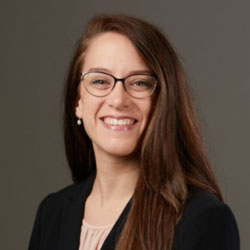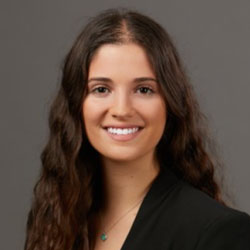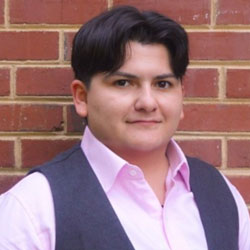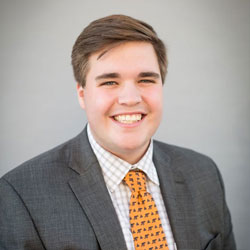Honoring Pride Month
Jessica Choate

As human beings, our experiences limit our world view. We misunderstand the needs of communities to which we don’t belong. We wrongly assume that other communities’ needs are the same as our own— or we refuse to recognize other communities at all. By including the LGBTQIA+ community—and all underrepresented communities—in the legal field, we help to correct those inevitable blind spots. For example, Mary Bonauto, an attorney I greatly admire, is a civil rights activist who identifies as gay. As a member of the LGBTQIA+ community, she has fought tirelessly for the advancement of our rights. She even argued before the Supreme Court in Obergefell v. Hodges, helping to secure the same sex right to marriage. And Bonauto is just one example of many LGBTQIA+ attorneys whose presence in the legal field secured rights for our community.
But in my opinion, including the LGBTQIA+ community in the legal field does more than advance the rights of the LGBTQIA+ community alone. Speaking for myself, a lesbian from the midwest, I bring the understanding of the weight that accompanies being an outsider. I know the fear, the knot in my stomach that inevitably forms whenever someone glares at my girlfriend and I holding hands during an afternoon walk. That fear used to weigh on me constantly, stealing energy from my everyday life. But the fear also made me more empathetic. It made me constantly aware of my own actions; my own ability to give someone else that fear. I bring that awareness with me every time I walk into work. I bring it to every client meeting, every staff meeting, and every legal decision I’ll make in the future. I take the time to consider my decision’s impact not only on my own community, but on communities to which I don’t belong. I thank my experience as an outsider for that willingness to be critical and to reject the norm. So, I think populating the legal field with people who have also had the “outsider experience” will make the legal field more compassionate and more responsive to communities’ needs.
Danielle LeGrand

Pride month means many things to me. It is a reminder that our community, despite all the fan-fare and corporate merchandise sales, developed from a place of struggle and oppression. It is a reminder that we, as open queer folk, owe our freedom of expression to the Black and Brown transgender women who fought for our right to exist and created Pride. It is a reminder that— while we can live and love openly— there are still members of our community who cannot, and we have to continue fighting for them. It is a celebration of how far we have come, but a reminder of how much farther we have to go. This month humbles me and fills me with gratitude for the women who started Pride. It is a time to take a breath and rejuvenate, gearing up for the fights ahead.
JJ Medina

Being queer, and specifically non-passing, has impacted my educational journey and the study of law in wondering if I’ll be accepted by a professor or classmate or reading about cases that have a tangible effect on my life. But I think those same experiences, though maybe not positive, taught me lessons in empathy and courage that have really pushed me to not take norms as fact and to challenge ideas to ensure they hold up to scrutiny. That same instinct serves me well in both education in general, and specifically in the study of the law.
Payton Thornton

Pride month is a celebration of the LGBTQ+ community that originated from the 1969 Stonewall Riots in New York City, which ignited pushback against police brutality directed at LGBTQ+ people and sparked the modern LGBTQ+ rights movement. In the years since, equal rights for LGBTQ+ Americans have progressed, but at a rate slower than ideal. Just in June 2020, the Supreme Court of the United States released the opinion in Bostock v. Clayton County, Georgia, affording protections from employment discrimination to LGBTQ+ people nationwide. LGBTQ+ citizens are still discriminated against in many areas of daily life — including housing, blood donations, adoption, and other critical areas of human existence.
Same sex marriage has only been nationally recognized since June 2015 in the Court’s decision in Obergefell v. Hodges, and homosexual activity was still largely criminalized in many states prior to the Court’s Lawrence v. Texas decision in 2003. This spring saw a wave of state legislation targeted at transgender people— some seeking to ban transgender people from sports, while others sought to make receiving or providing gender-affirming healthcare a felony outright. As LGBTQ+ Americans still face grave inequities in treatment by the law, it is important to celebrate the resiliency of the LGBTQ+ community in the decades since the Stonewall Riots and highlight the pressing need to secure equal protections for the LGBTQ+ community under the law. The law has come a long way since the beginning of the modern LGBTQ+ rights movement in New York City in 1969, but there is still much more to be done to protect the LGBTQ+ community.
For more information on the law school’s LGBTQIA+ student group, Equality Alliance, please visit our landing page here and feel free to contact leadership about getting involved.